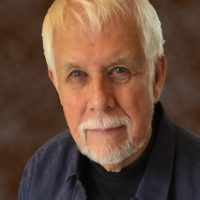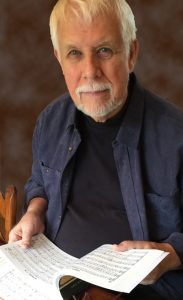
Zack Allen was born and raised in Asheville, but he also spent time in Anson County where he learned to play clawhammer banjo from his grandfather. His grandfather, a carpenter, had removed the first 10 frets from his own banjo to make a semi-fretless neck, and he played an old-time double-thumb clawhammer style. When Zack discovered his grandfather’s banjo in a closet and cleaned it up to playable condition, his grandfather encouraged Zack to play the newly developed Scruggs style instead of the older style. Zack tried three-finger picking for a couple years, but abandoned that in favor of the clawhammer style.
Older members of his family sang old ballads, which also interested Zack, and he spent a lot of time visiting them and learning the old songs. He tracked down other older musicians and spread the word that he was interested in meeting older singers and fiddlers. During this time, with encouragement from Bascom Lamar Lunsford, Zack recorded and documented traditional music.
Zack played for local gatherings and jam sessions in homes around Asheville until he joined his first band, playing second banjo with The Hornpipers. The “lead” banjo player was Carroll Best, an award-winning musician from western North Carolina who perfected an intricate finger-picking technique that allowed him to perform a variety of tunes-from complex hornpipes to breakdowns-with great precision and beautiful tone, a style passed through his family for generations. The fiddler in the band was Tommy Hunter from Madison County, whose sensitive and melodic style and ability to play the difficult hornpipe tunes were much admired and emulated by fellow musicians. Both Best and Hunter were recipients of the North Carolina Folk Heritage Award. Mack Snoderly also played fiddle in the group. The melodic style of the group was very influential on Zack’s playing, and he developed a melodic clawhammer technique. The group and its successor, the Carroll Best String Band, played in many festivals and competitions, and later recorded an album, along with guitarist Danny Johnson and bassist Calvin Parham.
Zack left the Carroll Best String Band and his twenty-year career as a writer and editor to pursue other interests, including serving four years as director of the Mountain Dance and Folk Festival and Shindig on the Green, working as a director of the Western North Carolina Nature Center, and eventually as an antique expert and appraiser. Throughout this time, he continued playing music.
He and his wife, Maggie Lauterer, a singer and musician in her own right, have moved to Maggie’s home town of Crossnore in Avery County after living in Asheville and Burnsville. Today, Zack is “mostly retired,” but music continues to be an important part of his life. He has played banjo for more than 50 years, but Zack modestly says, “I’ve always been a performer by necessity.”
Availability:
Zack performs solo and with his wife Maggie Lauterer as a duo. He plays banjo, and she plays dulcimer, and they both sing. They talk a lot about the music they play, and strongly encourage their audiences to seek out their own family’s music, as their family’s music was so important to them. Maggie is retired, but stays busy as a Presbyterian minister. When their schedules allow it, they love to share their music.



